There is a growing body of evidence, assembled and interpreted by talented China experts, that the Chinese government is indeed aiming for global power and perhaps global primacy over the next generation — that it seeks to upend the American-led international system and create at least a competing, quasi-world order of its own, says Hal Brands, the Henry Kissinger Distinguished Professor at Johns Hopkins University’s School of Advanced International Studies.
Seen through a Chinese Communist Party lens, promoting democracy and human rights is neither moral nor benign, but propaganda supporting a dangerous doctrine that threatens to delegitimize the Communist government and energize its domestic enemies. U.S.-led international institutions appear as tools for imposing America’s will on weaker states, he writes.

Credit: IISS
The CCP recognizes that the liberal international order has brought benefits, writes Nadege Rolland, a senior fellow at the National Bureau of Asian Research, but “the party abhors and dreads” the principles on which it is based.
The CCP’s propaganda is based on the conviction that China’s 5000 year term as the global superpower – where it had the dominant military, culture and technology – was interrupted by “the century of humiliation” between 1839 and 1949 in which China was disemboweled by the West, Russia and Japan, notes analyst Christopher Joye:
Xi passionately believes in “the eventual demise of capitalism and the ultimate victory of socialism”. China watcher Tanner Greer explains that Xi argues that the CPC “is tasked with ‘building a socialism that is superior to capitalism’ [and] whose economic and technological prowess will give it ‘the dominant position’ in world affairs”. “And though Xi asserts that this is inevitable, [he warns] ‘the road will be tortuous’”.
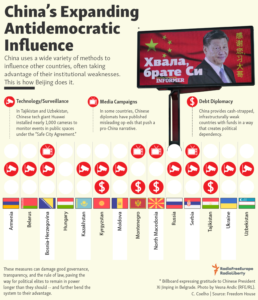
RFE/RL
China is now among the biggest threats to the US, New York GOP Rep. Elise Stefanik told The NY Post. One of the lawmakers nominated to a new China Task Force, Stefanik said it would not only take China to task over its mishandling of the coronavirus crisis, but seek to curb its growing influence on the world stage.
“I believe that the China Task Force is not only about China’s mishandling and propaganda over the course of this pandemic. This is an opportunity to put forth policies to deal with China as a generational issue,” said Stefanik (R-Schuylerville), the ranking member of the Subcommittee on Intelligence and Emerging Threats and Capabilities.
“As we think about emerging threats, China is one of the most significant emerging threats that we face, not only in the United States, but that we face when we’re partnered with our allies,” she said.
The global coronavirus pandemic raises a fundamental question about President Xi Jinping, that National People’s Congress delegates will studiously avoid over the coming week: whether the direction he has guided the country in over the past seven years, characterised by increasingly strict party control of civil society, has fundamentally strengthened or weakened its capacity to govern, the FT’s Tom Mitchell writes in a must-read (and free to read) analysis:
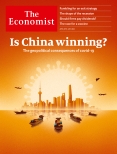 According to party documents obtained by the Associated Press last month, national health officials warned on January 14 in an internal meeting that China faced a “severe and complex public health event”, adding that “the risk of transmission and spread is high”. But Beijing did not make a public announcement until January 20….. Mr Xi’s disappearing act in late January and early February could indicate that even China’s most powerful leader since Mao Zedong was finding it difficult to get to the bottom of what was happening in Wuhan, says a China analyst at the Center for Strategic and International Studies in Washington.
According to party documents obtained by the Associated Press last month, national health officials warned on January 14 in an internal meeting that China faced a “severe and complex public health event”, adding that “the risk of transmission and spread is high”. But Beijing did not make a public announcement until January 20….. Mr Xi’s disappearing act in late January and early February could indicate that even China’s most powerful leader since Mao Zedong was finding it difficult to get to the bottom of what was happening in Wuhan, says a China analyst at the Center for Strategic and International Studies in Washington.
“The instinct of local officials in China, or any similar system, is not to say, just before the biggest holiday of the year: ‘We have a catastrophe on our hands,’” says Christopher Johnson. “The bottom line was Xi didn’t have his people in Wuhan initially so he didn’t know what the right information was. The real risk [he faced] was coming out and saying that ‘things are great’ or ‘things are terrible’ and then being proven wrong three days later. That’s how you get yourself in trouble.”
 Minxin Pei, a China specialist at Claremont McKenna College in California, says it is not yet clear whether “the Chinese economy can recover after this shock, especially after the expected restructuring of global supply chains and another escalation in US-China tensions”. “These issues will have a real impact on the livelihoods of ordinary Chinese people,” adds Pei, a contributor to the National Endowment for Democracy’s Journal of Democracy.
Minxin Pei, a China specialist at Claremont McKenna College in California, says it is not yet clear whether “the Chinese economy can recover after this shock, especially after the expected restructuring of global supply chains and another escalation in US-China tensions”. “These issues will have a real impact on the livelihoods of ordinary Chinese people,” adds Pei, a contributor to the National Endowment for Democracy’s Journal of Democracy.
But Jessica Chen Weiss, author of Powerful Patriots, argues that “coronavirus appears to have strengthened Xi’s grasp on power, despite the shockwave that the outbreak initially sent through the system”.
“The struggles of other countries,” she adds, “have made it harder for liberals to argue democratisation is the solution to China’s ills.”
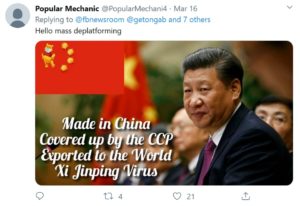
Wikipedia
Even if the Chinese party-state ultimately led a successful containment effort, many critics counter that the system’s rigidity cost it an opportunity to ringfence the outbreak in Wuhan in early January. In an online post this month that was quickly censored, Zhang Xuezhong, a Shanghai-based constitutional law expert and longtime party critic, lamented the consequences of Mr Xi’s authoritarian rule, the FT adds.
“The government’s tight controls have almost completely destroyed the ability of Chinese society to help itself,” he wrote. Mr Zhang’s comments echoed a similar critique written in late February by Ren Zhiqiang, a former property executive and party member who has been highly critical of Mr Xi’s crackdowns on civil freedoms.
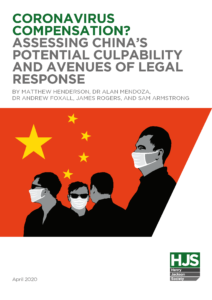 “No matter how many shortcomings exist in China’s administrative system, if there was freedom of speech citizens could have taken measures to protect themselves,” wrote Mr Ren, who has since been detained by the party’s discipline inspection commission. “Simply trusting the people with freedom of speech could have achieved a great victory in preventing and managing this epidemic, and there wouldn’t have been such a huge price to pay.” RTWT
“No matter how many shortcomings exist in China’s administrative system, if there was freedom of speech citizens could have taken measures to protect themselves,” wrote Mr Ren, who has since been detained by the party’s discipline inspection commission. “Simply trusting the people with freedom of speech could have achieved a great victory in preventing and managing this epidemic, and there wouldn’t have been such a huge price to pay.” RTWT
A couple of years ago the FT’s Jamil Anderlini interviewed a former leader of the Savak — the Shah of Iran’s feared secret police — in the US, where he still lives in hiding at an undisclosed location, with a price on his head. He remains certain that if the Shah had taken his advice and resolutely crushed the 1978 uprising in its early stages, the Iranian revolution would not have succeeded. Mr Xi seems to have taken that lesson to heart: whatever else you say about him, he cannot be accused of being irresolute on quashing dissent.
Since February, the Communist party’s image at home has been helped immeasurably by the disastrous virus response from other major countries, especially the US and UK, and helped Beijing build solidarity and nationalism, Anderlini adds. Though some in the west wish China was on the cusp of open rebellion, they are likely to be disappointed.
America Is in a New Cold War and This Time the Communists Might Win,
As the ideological competition with Beijing intensifies, “the defenders of the liberal international order, like-minded democracies, should grow more active in defense of their interests and values,” says Rand Corporation’s Scott Harold.
The CCP’s perceived deceptions surrounding the COVID-19 outbreak, which has cost hundreds of thousands of lives globally, have galvanised an emerging coalition, encompassing most democracies, analyst Joye writes for the Australian Financial Review.
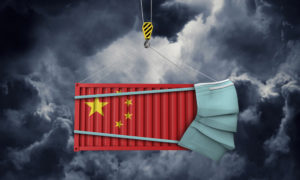
NED Forum/shutterstock
Western moves to decouple from China by shifting global supply chains “represents an existential crisis for the CCP because its longevity and legitimacy have been predicated on the idea that the party (not capitalism) is responsible for revolutionising living standards for all its people with the quid pro quo being the sacrifice of freedom of thought and action,” he notes. “Xi is the first to admit China cannot compete with open democracies’ innovation and ingenuity,” which leaves the ruling CCP with three strategic options:
- The first is dropping the bully boy program and once again hiding and biding, pretending to play by the rules of the capitalist system until China is truly in a position of unassailable power and can have its way with the world, unleashing socialism upon it. This is a plausible possibility in the near-term, although perhaps unlikely under a hardline and ideological president like Xi.
- A second option is to discard the socialist ideal altogether, accept China’s current business model is flawed, and embrace the reality that the best operating system available to it is probably the Singaporean approach of soft authoritarianism coupled with limited democracy that preserves a one-party political state.
- A final path is the belligerent Leninist conclusion that these struggles solidify the CPC’s internal control and constituency, and are a natural evolution on the road to socialism. In this scenario, Xi seeks to continue to divide and conquer the flawed western democracies…. Strategic overreach, which has been the defining characteristic of Xi’s term, remains the order of the day.

@ELuttwak
Ignoring the lessons of history and the CPC’s mistakes since 2012, and assuming that ideology provides the perfect panacea, will almost certainly result in the regression of China back to yet another middling, authoritarian power in the mould of Russia, albeit without the latter’s natural resource advantages, Joye concludes. RTWT
The Chinese government has flooded the European information space with disinformation, in an effort to control the narrative around the pandemic and divert the blame. The EU should launch a specialist team to counter the poisonous environment created by Chinese info-war operations, write Jakub Janda and Nathalie Vogel of the Prague-based European Values Center for Security Policy.
Can the US compete with China without starting a new Cold War, analysts Ian Bremmer, Kelsey Broderick and Jeffrey Wright ask (above).

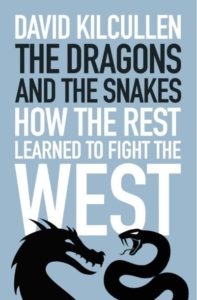 In a just-published book—
In a just-published book—





